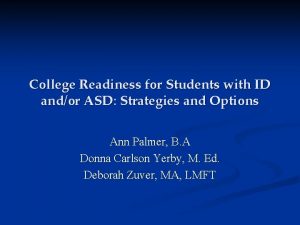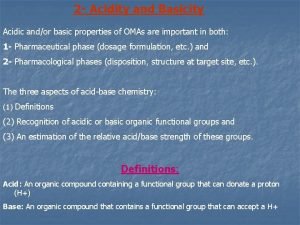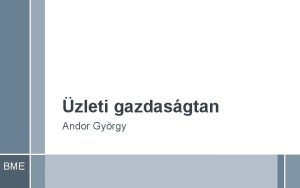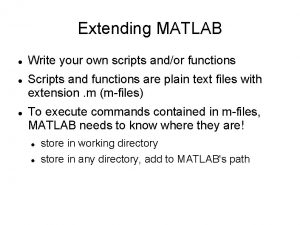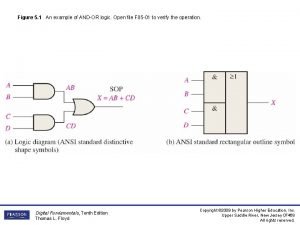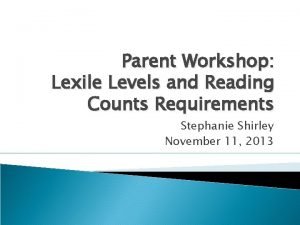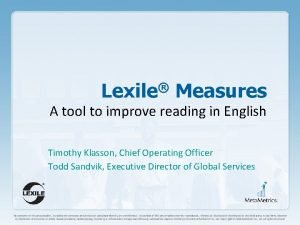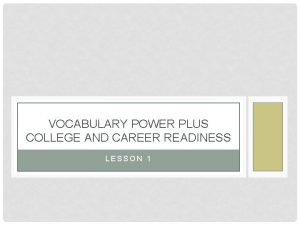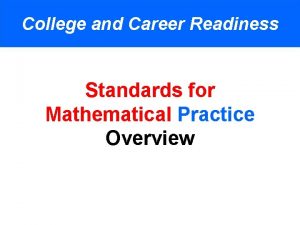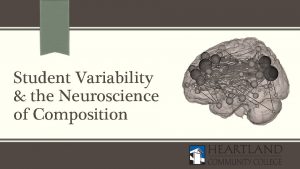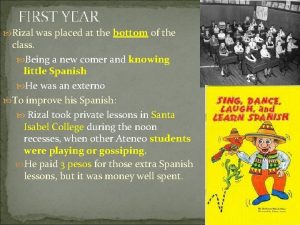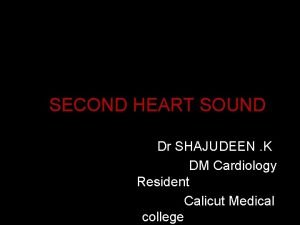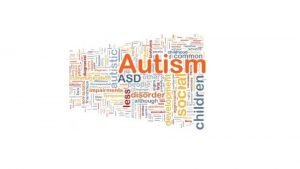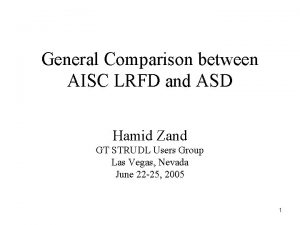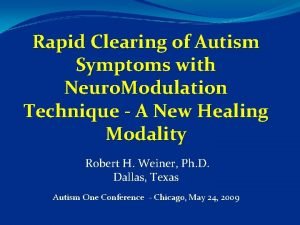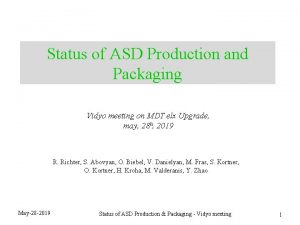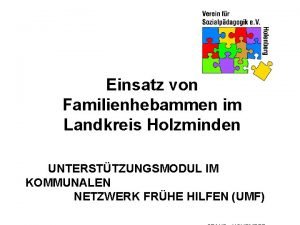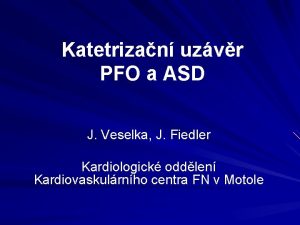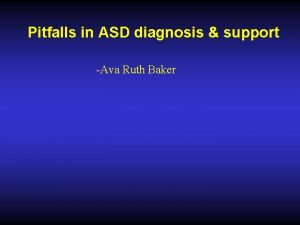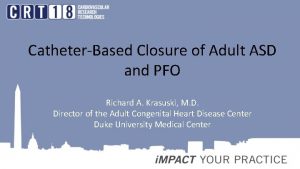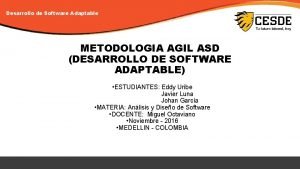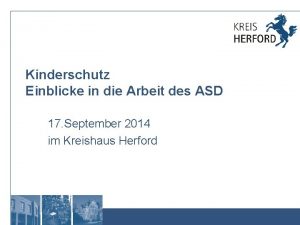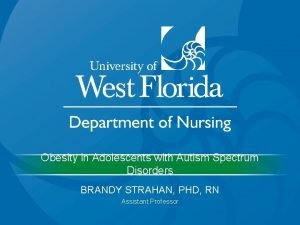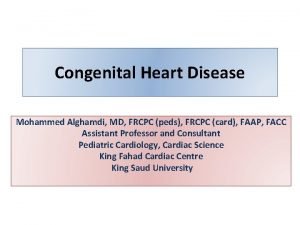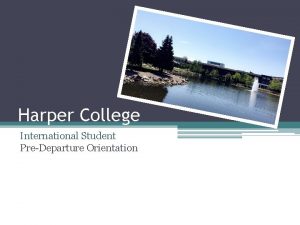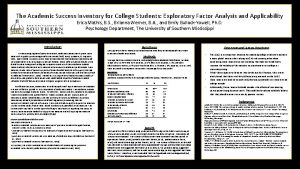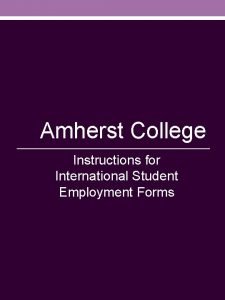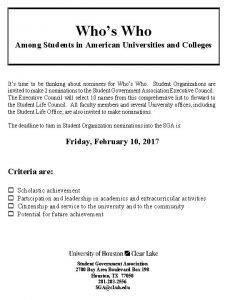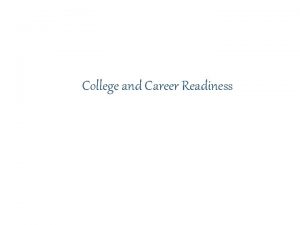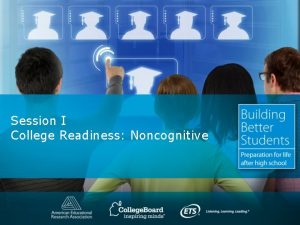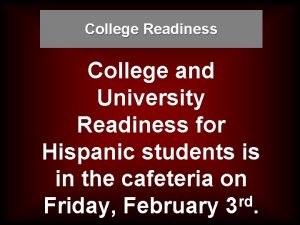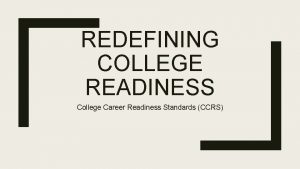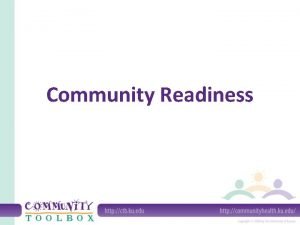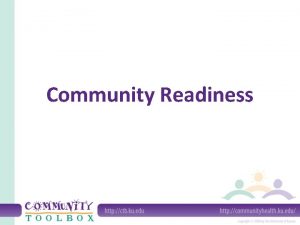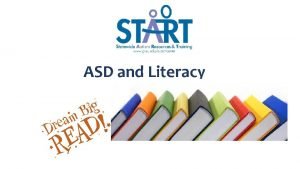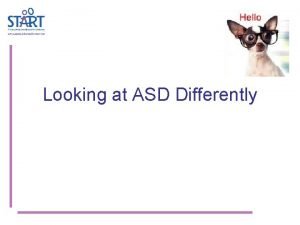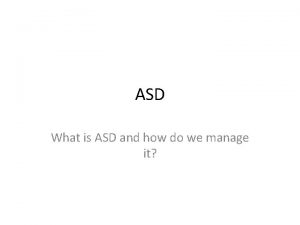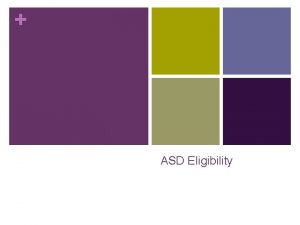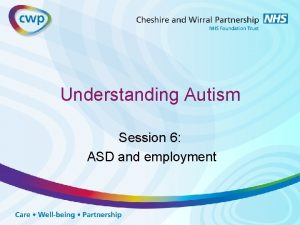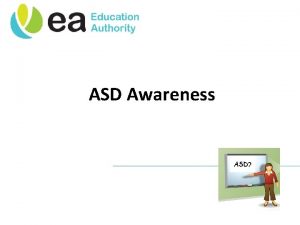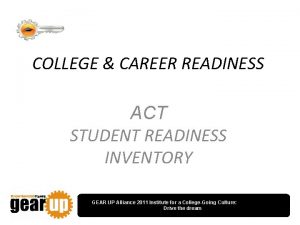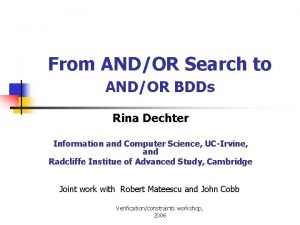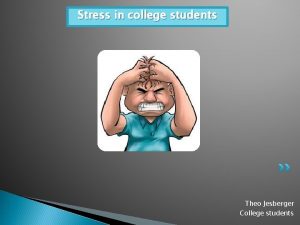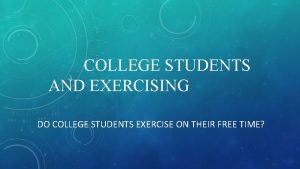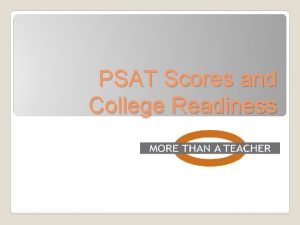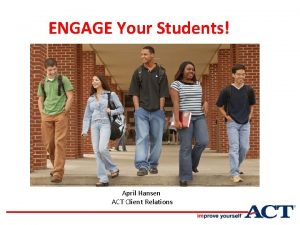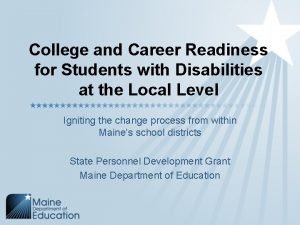College Readiness for Students with ID andor ASD
















































- Slides: 48

College Readiness for Students with ID and/or ASD: Strategies and Options Ann Palmer, B. A Donna Carlson Yerby, M. Ed. Deborah Zuver, MA, LMFT

Transition Plan under IDEA In NC, should be in place by age 14 n May be included in annual IEP meeting n Student should be invited to attend n Transition- “Movement from school to postschool activities”- post-secondary education, vocational education, supported employment, independent living, and adult services n

Preparing for Transition Envision the future- parent’s vision and student’s vision n Research all options n Get advice from other parents and professionals n Create practical and useful IEP/ITP goals n Balance academics and functional skills n

Functional Skills n Independent Living n n Personal Hygiene n n Will the student be able to live in the community? What level of help will they need? Can student independently take care of their self- care needs? What skills do they need to work on? Communication n Can the student initiate asking for help? Are they able to report information? Can student answer the phone, e-mail, make

Functional Skills n Financial n n Transportation n n Can the student use money in a functional way? Can they follow a budget? How will the student get around as an adult? Do they know how to access public transportation? Vocational n What work skills does the student need to do their dream job? How are their interpersonal skills? How much assistance will they need in

Options for a Higher Education Experience Different kinds of schools- Community Colleges or 2 or 4 year Colleges n Part-time versus full-time n Virtual classes- on-line, video n Commuting versus living on campus n Support programs within the college setting specifically for students with learning differences n

Leaving IDEA Behind No more IEP’s n No more requirements to serve the student n Post-secondary Education Laws n Section 504 of the Rehabilitation Act of 1973 n Americans with Disabilities Act of 1990 and ADA Amendments Act of 2008 n

Implications of 504 and ADA Those who have qualified for admissions have a right to be in higher education. n Once admitted, students have a right to access academic and nonacademic programs. n Students have a right to confidentiality of all disability-related information. n Qualified students are eligible to receive REASONABLE accommodations that relate to their learning needs. (level the n


Full Inclusion College Experience Student goes through admissions process just like any other student n Student must disclose about their diagnosis if they want any accommodations n Student must follow guidelines for all students n Parents have limited participation n Student must self-advocate n

Preparing the Student Discuss differences between HS and College n Discuss functional skills n Safety - On campus, in dorm room, on the computer n Academic Issues - Study skills, how to know when they needs help and how to get help n Health Issues - How to know if they are sick, who to call, when to go to the doctor n Personal Care - Shaving, showering, laundry n

Help the Student Get Organized Contact numbers for family members, campus services (RA, Disabilities Services, etc. ) n Map of campus and bus routes n Financial information n Housing information n Social options n To do lists n Calendar or list of important dates to n

Gather Documentation identifies that the student has a diagnosis and how it impacts their learning. n Colleges can decide what kind of documentation they require. n IEP’s are not acceptable documentation. n Documentation must be current. n Documentation drives accommodations. n

Possible Accommodations Extended time for testing n Separate setting for testing n Priority seating in classroom n Priority registration n Hard copies of notes n Tape recording lectures n Single dorm room * Must go through Disabilities Services to access n

Disabilities Services Office Can be a crucial support for the student n Formal disclosure must happen here to receive services or accommodations n Make connection as early as possible n Student needs to develop a comfort level with the office and the staff n Regular scheduled appointments if possible n Student has to self-advocate! n

Self-Advocacy Student is an adult- has to initiate n Student needs to understand his/her needs n Student needs to be able to ask for help and explain why they need help n No information shared with parents unless student requests that in writing n n FERPA Waiver- Federal Educational Rights and Privacy Act

Preparing the Student for Self-Advocacy in Adulthood Increase student’s awareness of his/her strengths and challenges n Help student understand that everyone learns differently; everyone needs help sometimes n Respect the student’s point of view; involve them in everyday decisions and choices n Allow the student to make mistakes n

Preparing the Student for Self-Advocacy in Adulthood Involve the student in school meetings and decisions at whatever level is appropriate n Give student experiences to build communication skills (school jobs, arranging meetings, reporting to teachers, etc. ) n Make problem-solving opportunities learning experiences n Talk about the future; prepare and plan n

Strategies for Success Structure/visuals- calendar, lists, schedules, organizers n Designated people to go to for help n Regular scheduled meetings w/DS, professors n Mentor n Relaxation strategies n Frequent communication n

In Conclusion Be creative; there is no one path that fits all. n The most difficult aspects of college may not be academics. n The parent’s role is going to change. n Letting go is going to be difficult. n Follow the student’s lead. n

s t n e d u t s t u o b l a a t u t a c h e l l W e t o n t i g h t n i wi o g s e i t i l i b a ? s e di g e l l o c

Reauthorization of Higher Education Opportunity Act (HEOA) 2008 n. Financial Aid n Pell Grants n Federal Work-study program n. Model Demonstration Programs (in NC: WCU & App State) n. National Coordinating Center n Think n. Certified College @ U Mass/Boston Transition Programs

What does IPSE for students with I/DD look like?

IPSE for students with IDD

A Standards-Based Conceptual Framework

Work-based Learning: Inclusive Opportunities n Interest inventories and assessments n Community partnerships for employment n Course selection related to employment goals n On-campus jobs; work-study opportunities n Specialized curriculum leading to certificate n Internships and job-based instruction

Paid Employment § Youth who participated in PSE were 26% more likely to leave Vocational Rehabilitation with paid employment § Earned a 73% higher weekly income Data Set: RSA 911 Migliore, A. , Butterworth, J. , & Hart, D. 2009. Postsecondary Education and Employment Outcomes for Youth with Intellectual Disabilities. Fast Facts Series, No. 1. Boston, MA: Institute for Community Inclusion

Predictors of Employment § § The only post-high school transition goal in IEPs that was a predictor of employment for students with ID was having the goal of attending a two or four year college. 11% of students with ID had this goal

Overview of PSE - Nationally n Less than 25% of students with I/DD have participated in any form of PSE n 6, 000+ students currently enrolled n Approx. 250 programs in 42 states

IPSE Options in North Carolina: Colleges and Universities n Appalachian State University: Students with Diverse Abilities : : model site 20152021 n UNC Greensboro: Beyond Academics n Western Carolina University: University Participant (UP) : : model site 2010 -2016 n UNC-Chapel Hill CIDD: LEND Trainee Leadership (graduate-level opportunity)

Western Carolina University: University Participant – UP n Two-year program – UP Certificate of Accomplishment (10 hr/wk on-campus internship) n Goal: facilitate transition of participants from secondary to adult life with education, employment, and independent living n Personal development, community participation, vocational preparation, social participation, course auditing n Inclusive dorms and residence halls

What do UP Participants do at WCU? Live in campus residence – college life with sameage peers n Have individual plan for personal/career development and success post-UP n Audit limited number of classes n Participate in campus events and activities n

The Impact of Inclusion at UP: Examples: n David: Works with paramedics – his dream job! n Typical students head to DC to support UP n Future employer discovers a pool of good workers n Typical students petition for UP students at

Appalachian State University: Students with Diverse Abilities (SDAP) n 2 -year program: Collegiate Achievement Award n College courses - audit and course to support independent living n Focus: Self-determination, college course access, meaningful employment, campus life n Job coaches find on- and off-campus employment; fellows, tutors, and GAs provide

UNC Greensboro: Beyond Academics n 4 -year certificate: Integrative Community Studies n Coursework: Electives of interest and range of courses to prepare students for selfdetermined lifestyle emphasizing careers, meaningful avocations, and community living n Internships n Campus participation and housing options

From (typical) WCU college students… n “Everyone deserves a chance to learn and to have a job. High school doesn’t do that. I want to see this grow. ” n “I’ve learned not to make assumptions about what they can or cannot do. Its changed this campus. ” n “As much as they learn, we also learn. If we could translate that into the community, the world would be a better place. ”

Community Colleges (CC): Seamless Transition Opportunities n Basic Skills Coordinators work with Transition Counselors in K-12 to educate families about CC options. n Once student is enrolled in Basic Skills, CC staff and VR support together. n Upon completion of CC program, VR takes lead in employment opportunities. 37

Options for ABE students n ABE – Cape Fear CC, Pitt CC n ABLE (Adult Basic Literacy Education) - Alamance CC n Compass Education – So Piedmont CC n Creating Successful Learners – Surry CC n Enrichment Center – Forsyth Tech CC

Work – Based Options ABE TOPS – Wake Tech CC n Accelerate to College and Career - Nash n Career College – Alamance CC, Haywood CC & Mayland CC n Career Exploration Academy – Pitt CC n PACE (Pathways to an Accessible College Experience) START Hospitality– College of the Albermarle n Project SEARCH – AB Tech, Central Piedmont CC, Southwestern CC, Robeson CC, Wake Tech n START Hospitality Program – Wake Tech CC n

Career College at Alamance CC n 1 year integrative post-secondary certificate program n Entry-level, provides foundation to transition into career or further coursework n Further develop reading, math, computer skills. n Hands-on practicum experience. 40

Alamance CC - Career College, cont. n Automotive Assistant n Health & Public Services Assistant n Greenhouse/Nursery Assistant

Project SEARCH www. projectsearch. us n Real-world experience n Postsecondary training and FREE internship experience n Work in high-status organizations n Learn high-demand skill sets n Work towards becoming more independent in employment, transportation & daily living

How does inclusion affect students and their families ?

Implications for Parents n Students college with I/DD can go to n How to support students with I/DD to access information and plan for college n Collaboration with teachers, parents, service providers, health

Funding Sources used by students Private pay ü State VR funds ü Other funding sources ü Scholarships ü Local Education Agency ü Federal/State grant ü Tuition waived ü Social Security funds ü 46% 14% 13% 9% 7% 7% 5% 3%

FROM RUBY’S RAINBOW APRIL 21, 2015 : : Preparing Your Son Or Daughter for College: Suggestions for Parents of Children with Intellectual Disability

Online Resources Think College www. thinkcollege. net n NC Postsecondary Education Alliance (PSEA) www. cidd. unc. edu/psea n Road to Learning and Earning www. rtle. org n Post-Secondary Education Research Center (PERC) www. transitiontocollege. net n n Info on options and trends; funded by OSEP. n The National Technical Assistance Center on Transition http: //transitionta. org/ n Builds capacity for transition outcomes.

College Readiness for Students with ID and/or ASD: Strategies and Options Thank you! : : : : : Ann Palmer Ann. palmer@cidd. unc. edu Donna Carlson Yerby donna. yerby@cidd. unc. edu Deborah Zuver deborah. zuver@cidd. unc. edu
 Asd college college readiness program
Asd college college readiness program Andor györgy üzleti gazdaságtan
Andor györgy üzleti gazdaságtan Andor insert
Andor insert Edu gtk bme
Edu gtk bme Andor basic
Andor basic Python jumpstart
Python jumpstart How are the inner planets alike
How are the inner planets alike Andor györgy üzleti gazdaságtan
Andor györgy üzleti gazdaságtan Andor matlab
Andor matlab Andor logic
Andor logic Andor györgy üzleti gazdaságtan
Andor györgy üzleti gazdaságtan Sri reading counts
Sri reading counts Lexile measure:
Lexile measure: Vocabulary power plus for college and career readiness
Vocabulary power plus for college and career readiness College and career readiness standards math
College and career readiness standards math Landmark college readiness assessment
Landmark college readiness assessment Rizal carved the image of the virgin mary
Rizal carved the image of the virgin mary Fixed split s2 causes
Fixed split s2 causes Asd
Asd Difference between asd and lrfd
Difference between asd and lrfd Ostium secondum
Ostium secondum äsd
äsd Committee 3000
Committee 3000 Asd crystel b
Asd crystel b Pddbi
Pddbi Asd
Asd Landkreis holzminden jugendamt
Landkreis holzminden jugendamt Secundum asd
Secundum asd Asd
Asd Big ass prof
Big ass prof Committee 3000
Committee 3000 Uzvr
Uzvr Ava asd
Ava asd Asd
Asd Types of autism spectrum disorder dsm 5
Types of autism spectrum disorder dsm 5 Software adaptable
Software adaptable Splitting of heart sounds
Splitting of heart sounds Simplified technical english examples
Simplified technical english examples Asd bmw
Asd bmw Asd herford
Asd herford Teacher info sheet
Teacher info sheet Asd brandy
Asd brandy Murmur in asd
Murmur in asd Harper college associate degrees
Harper college associate degrees The academic success inventory for college students
The academic success inventory for college students Communication skills jeopardy
Communication skills jeopardy Social media etiquette for college students
Social media etiquette for college students Amherst college employment
Amherst college employment Who's who among american college students
Who's who among american college students
